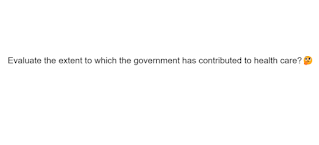Evaluate the extent to which the government has contributed to health care?
Question: Evaluate the extent to which the government has contributed to health care?
The extent to which the government has contributed to healthcare varies significantly based on the country, its political system, economic status, and historical context. However, I can provide you with a general evaluation of the ways in which governments often contribute to healthcare systems:
1. Funding and Financial Support: Governments typically allocate a portion of their budget to fund healthcare services and facilities. This can include financing public hospitals, clinics, research institutions, and public health programs. Government funding helps ensure that essential healthcare services are accessible to all citizens, regardless of their socio-economic status.
2. Regulation and Oversight: Governments play a crucial role in regulating and overseeing healthcare standards, practices, and safety. They establish guidelines for medical procedures, pharmaceuticals, medical equipment, and healthcare facilities to ensure that the quality of care is maintained and that public health is protected.
3. Public Health Initiatives: Governments often initiate public health campaigns to promote wellness, prevent disease, and raise awareness about health-related issues. These initiatives can include vaccination programs, awareness campaigns about healthy lifestyle choices, and education on how to prevent the spread of diseases.
4. Health Insurance and Universal Coverage: In many countries, governments establish healthcare insurance systems that aim to provide universal coverage to their citizens. These systems can be fully government-funded (single-payer systems) or a mix of public and private funding. Universal healthcare coverage ensures that individuals can access necessary medical services without facing significant financial burdens.
5. Research and Development: Government funding often supports medical research and development, which leads to advancements in medical technology, treatments, and therapies. This research can contribute to improving healthcare outcomes and overall patient care.
6. Emergency Preparedness: Governments are responsible for developing strategies and resources to respond to health emergencies, such as pandemics or natural disasters. They coordinate disaster response efforts, ensure the availability of medical supplies, and establish communication channels to disseminate critical health information.
7. Healthcare Workforce Development: Governments may invest in the training and development of healthcare professionals. This includes subsidizing medical education, offering scholarships for medical students, and providing incentives for healthcare professionals to work in underserved areas.
8. Infrastructure Development: Governments often invest in building and maintaining healthcare infrastructure, including hospitals, clinics, laboratories, and research centers. This infrastructure is essential for delivering medical services and conducting research.
However, the effectiveness of government contributions to healthcare can vary. Challenges such as bureaucratic inefficiencies, inadequate funding, political considerations, and disparities in access to care can impact the outcomes of these contributions. It's essential to evaluate each country's healthcare system individually to understand the specific extent and impact of government involvement in healthcare.


0 Komentar
Post a Comment